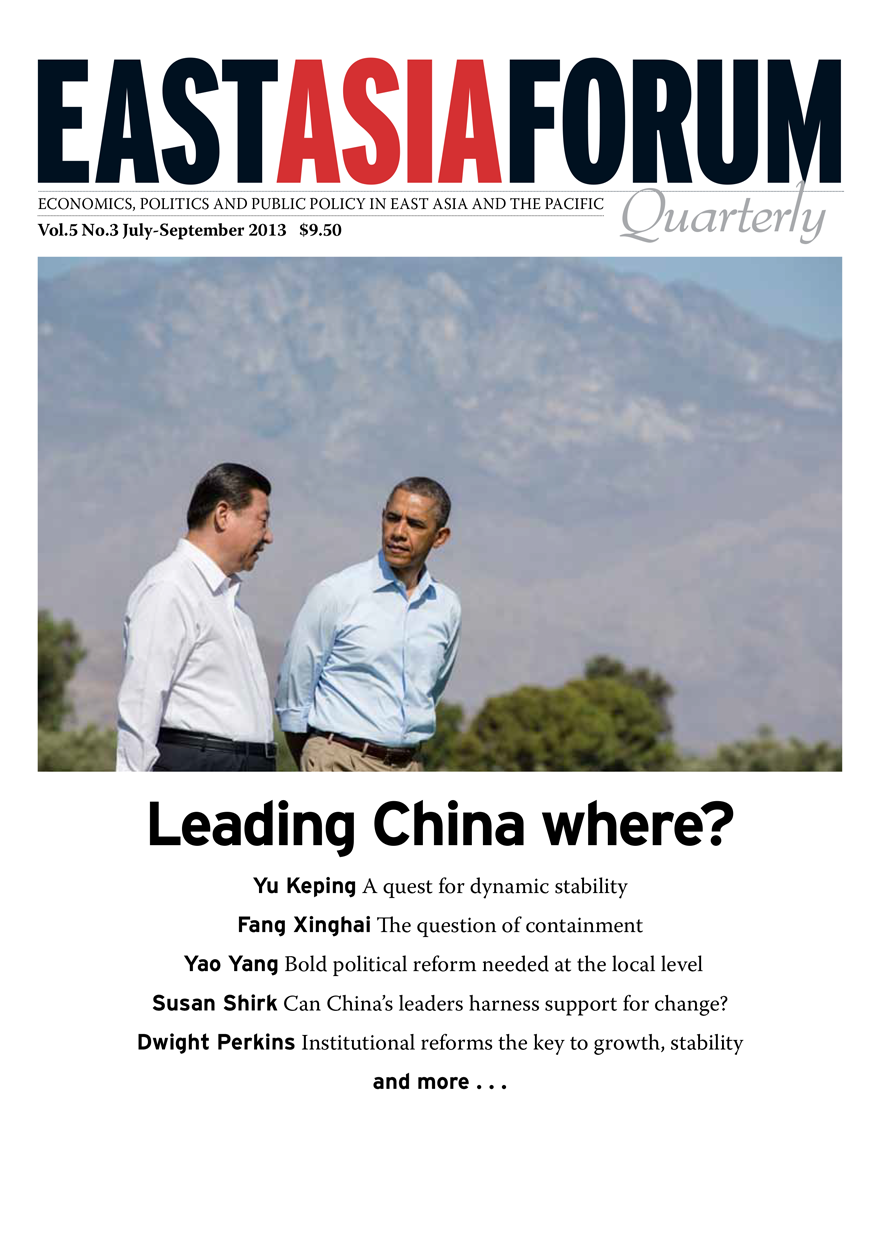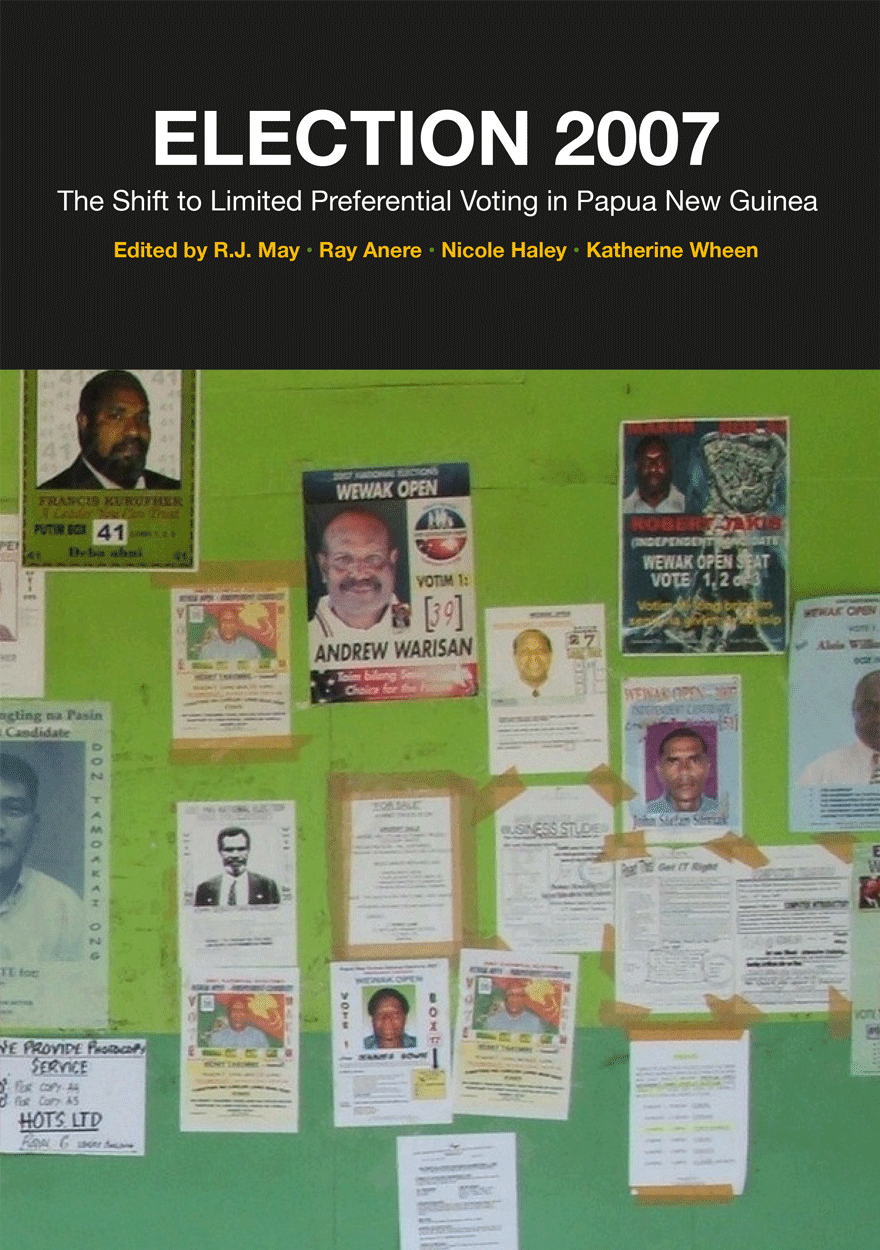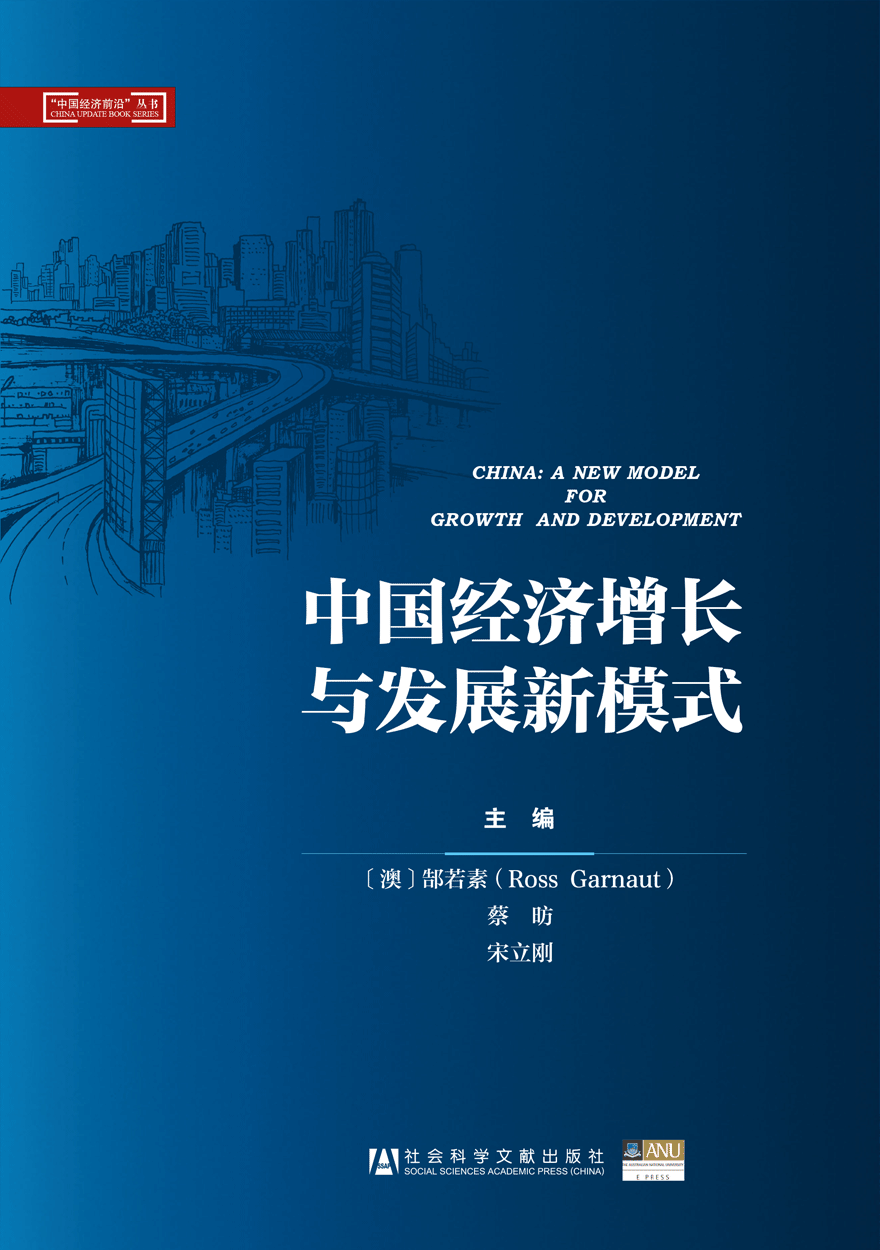Search titles
Displaying results 241 to 250 of 376.

East Asia Forum Quarterly: Volume 5, Number 4, 2013 »
Publication date: December 2013
East Asia Forum Quarterly grew out of East Asia Forum (EAF) online, which has developed a reputation for providing a platform for the best in Asian analysis, research and policy comment on the Asia Pacific region in world affairs. EAFQ aims to provide a further window onto research in the leading research institutes in Asia and to provide expert comment on current developments within the region. The East Asia Forum Quarterly, like East Asia Forum online, is an initiative of the East Asia Forum (EAF) and its host organisation, the East Asian Bureau of Economic Research (EABER) in the Crawford School of Economics and Government in the College of Asia & the Pacific at The Australian National University.
Download for free
Not available for purchase

Rebalancing and Sustaining Growth in China (Chinese version) »
中国经济再平衡与可持续增长
Authored by: Huw Mckay, 宋立刚 主编
Publication date: November 2013
中国经济需要重新平衡的想法,不再是国家内部或外部的争议。无论是收入不平等日益认识到在家里仍然很大外部盈余;对消费和产业升级的政策话语的焦点;住房负担能力的大幅度下滑的经济,政治和社会紧张局势之间的深刻冲突工业化,城镇化和生物圈顶部的国有企业和民营企业的盈利能力之间的鸿沟;或单向压力推动实际汇率的证据,赞成的高度不平衡的结构是无所不在的。
Chinese print version of this book is available from Social Science and Academic Press

Tajikistan »
A Political and Social History
Authored by: Kirill Nourzhanov, Christian Bleuer
Publication date: October 2013
This book is a historical study of the Tajiks in Central Asia from the ancient times to the post-Soviet period. For millennia, these descendants of the original Aryan settlers were part of many different empires set up by Greek, Arab, Turkic and Russian invaders, as well as their own, most notably during the Middle Ages. The emergence of the modern state of Tajikistan began after 1917 under Soviet rule, and culminated in the promulgation of independence from the moribund USSR in 1991. In the subsequent civil war that raged between 1992 and 1997, Tajikistan came close to becoming a failed state. The legacy of that internal conflict remains critical to understanding politics in Tajikistan a generation later.
Exploring the patterns of ethnic identity and the exigencies of state formation, the book argues that despite a strong sense of belonging underpinned by shared history, mythology and cultural traits, the Tajiks have not succeeded in forming a consolidated nation. The politics of the Russian colonial administration, the national-territorial delimitation under Stalin, and the Soviet strategy of socio-economic modernisation contributed to the preservation and reification of sub-ethnic cleavages and regional identities. The book demonstrates the impact of region-based elite clans on Tajikistan’s political trajectory in the twilight years of the Soviet era, and identifies objective and subjective factors that led to the civil war. It concludes with a survey of the process of national reconciliation after 1997, and the formal and informal political actors, including Islamist groups, who compete for influence in Tajik society.
“Tajikistan: A Political and Social History is the best source of information on this important country in the English language. Drs Nourzhanov and Bleuer present a comprehensive yet detailed account of the past and prospects of this emerging nation, and have filled one of the major gaps in Central Asian scholarship. This book must be read by those who wish to grasp the vagaries of Central Asia’s evolving political and cultural landscapes.”
— Reuel Hanks, Professor of Geography, Oklahoma State University, and Editor of the Journal of Central Asian Studies.
“If Tajikistan is known outside its region, it is often for the civil war that gravely damaged it. This volume authoritatively provides the longer perspective to the unsettling events of the 1990s and skilfully explains them in terms of history, social structure, and sub-state identities. In addition to highlighting a wealth of local factors, it is insightful on the ways in which antagonists can be transformed into broader ethnic and regional blocs. Kirill Nourzhanov and Christian Bleuer are erudite guides to an understudied part of Central Asia, while astutely instructing us about larger patterns of state-society relations and their impact on the logic of conflict.”
— James Piscatori, Professor of International Relations, Durham University.

Making Change Happen »
Black and White Activists talk to Kevin Cook about Aboriginal, Union and Liberation Politics
Authored by: Kevin Cook, Heather Goodall
Publication date: September 2013
This book is a unique window into a dynamic time in the politics and history of Australia. The two decades from 1970 to the Bicentennial in 1988 saw the emergence of a new landscape in Australian Indigenous politics. There were struggles, triumphs and defeats around land rights, community control of organisations, national coalitions and the international movement for Indigenous rights. The changes of these years generated new roles for Aboriginal people. Leaders had to grapple with demands to be administrators and managers as well as spokespeople and lobbyists. The challenges were personal as well as organisational, with a central one being how to retain personal integrity in the highly politicised atmosphere of the ‘Aboriginal Industry’. Kevin Cook was in the middle of many of these changes – as a unionist, educator, land rights campaigner, cultural activist and advocate for liberation movements in Southern Africa, the Pacific and around the world. But ‘Cookie’ has not wanted to tell the story of his own life in these pages. Instead, with Heather Goodall, a long time friend, he has gathered together many of the activists with whom he worked to tell their stories of this important time. Readers are invited into the frank and vivid conversations Cookie had with forty-five black and white activists about what they wanted to achieve, the plans they made, and the risks they took to make change happen.
“You never doubted Kevin Cook. His very presence made you confident because the guiding hand is always there. Equal attention is given to all. I am one of many who worked with Cookie and Judy through the Tranby days and in particular the 1988 Bicentennial March for Freedom, Justice and Hope. What days they were. I’m glad this story is being told.”
— Linda Burney, MLA New South Wales
“Kevin Cook was a giant in the post-war struggle for Aboriginal rights. His ability to connect the dots and make things happen was important in both the political and cultural resurgence of the 1970s onwards.”
— Meredith Burgmann, former MLC, New South Wales
“Kevin has had a transformative effect on the direction of my life and the lives of so many other people. This book is an important contribution to understanding not only Kevin’s life but also the broader struggles for social and economic justice, for community empowerment and of the cooperative progressive movement. It will greatly assist the ongoing campaign for full and sustainable reconciliation.”
— Paddy Crumlin, National Secretary, Maritime Union of Australia
“Cookie has made great contributions in enhancing the struggles of our people. He is a motivator, an astute strategist, and an excellent communicator with wonderful people skills. It’s a pleasure to be able to call him a mate and a brother.”
— John Ah Kit, former MLA, Northern Territory
For more information on Aboriginal History Inc. please visit aboriginalhistory.org.au.

East Asia Forum Quarterly: Volume 5, Number 3, 2013 »
Publication date: September 2013
East Asia Forum Quarterly grew out of East Asia Forum (EAF) online, which has developed a reputation for providing a platform for the best in Asian analysis, research and policy comment on the Asia Pacific region in world affairs. EAFQ aims to provide a further window onto research in the leading research institutes in Asia and to provide expert comment on current developments within the region. The East Asia Forum Quarterly, like East Asia Forum online, is an initiative of the East Asia Forum (EAF) and its host organisation, the East Asian Bureau of Economic Research (EABER) in the Crawford School of Economics and Government in the College of Asia & the Pacific at The Australian National University.
Download for free
Not available for purchase

Breaking Japanese Diplomatic Codes »
David Sissons and D Special Section during the Second World War
Edited by: Desmond Ball, Keiko Tamura
Publication date: September 2013
During the Second World War, Australia maintained a super-secret organisation, the Diplomatic (or ‘D’) Special Section, dedicated to breaking Japanese diplomatic codes. The Section has remained officially secret as successive Australian Governments have consistently refused to admit that Australia ever intercepted diplomatic communications, even in war-time.
This book recounts the history of the Special Section and describes its code-breaking activities. It was a small but very select organisation, whose ‘technical’ members came from the worlds of Classics and Mathematics. It concentrated on lower-grade Japanese diplomatic codes and cyphers, such as J-19 (FUJI), LA and GEAM. However, towards the end of the war it also worked on some Soviet messages, evidently contributing to the effort to track down intelligence leakages from Australia to the Soviet Union.
This volume has been produced primarily as a result of painstaking efforts by David Sissons, who served in the Section for a brief period in 1945. From the 1980s through to his death in 2006, Sissons devoted much of his time as an academic in the Department of International Relations at ANU to compiling as much information as possible about the history and activities of the Section through correspondence with his former colleagues and through locating a report on Japanese diplomatic codes and cyphers which had been written by members of the Section in 1946. Selections of this correspondence, along with the 1946 report, are reproduced in this volume. They comprise a unique historical record, immensely useful to scholars and practitioners concerned with the science of cryptography as well as historians of the cryptological aspects of the war in the Pacific.
“This publication fills an important gap in the present available knowledge concerning code-breaking in Australia during World War II. It also gives overdue recognition to the important contribution made by David Sissons to this subject”.
— Professor John Mack, School of Mathematics and Statistics, University of Sydney.

Election 2007 »
The Shift to Limited Preferential Voting in Papua New Guinea
Edited by: R.J. May, Ray Anere, Nicole Haley, Katherine Wheen
Publication date: September 2013
Papua New Guinea’s general election in 2007 attracted particular interest for several reasons. Not only did it follow what was widely acknowledged as the country’s worst election ever, in 2002 (in which elections in six of the country’s 109 electorates were declared to be ‘failed elections’), it was the first general election to be held under a new limited preferential voting system. It also followed the first full parliamentary term under the Organic Law on the Integrity of Political Parties and Candidates, which had been introduced in 2001 in an attempt to strengthen political parties and create a greater degree of stability in the national parliament, and was the first to embrace a ‘whole-of-government’ approach to electoral administration, through an Interdepartmental Electoral Committee. This volume provides an analysis of the 2007 election, drawing on the work of a domestic monitoring team organized through the National Research Institute, and several visiting scholars. It addresses key issues such as voter education, electoral administration, election security, the role of political parties, women as candidates and voters, the shift to limited preferential voting, and HIV transmission, and provides detailed accounts of the election in a number of open and provincial electorates. It is generally agreed that the election of 2007 was an improvement on that of 2002. But problems of electoral administration and voting behaviour remain. These are identified in this volume, and recommendations made for electoral reform.

Putting Citizens First »
Engagement in Policy and Service Delivery for the 21st Century
Publication date: August 2013
This book explores the ways in which governments are putting citizens first in their policy-making endeavours. Making citizens the focus of policy interventions and involving them in the delivery and design is for many governments a normative ideal; it is a worthy objective and sounds easy to achieve. But the reality is that putting citizens at the centre of policy-making is hard and confronting. Are governments really serious in their ambitions to put citizens first? Are they prepared for the challenges and demands such an approach will demand? Are they prepared to commit the time and resources to ensure genuine engagement takes place and that citizens’ interests are considered foremost? And, more importantly, are governments prepared for the trade-offs, risks and loss of control such citizen-centric approaches will inevitably involve?
The book is divided into five parts:
setting the scene: The evolving landscape for citizen engagement
drivers for change: Innovations in citizen-centric governance
case studies in land management and Indigenous empowerment
case studies in fostering community engagement and connectedness
case studies engaging with information technology and new media.
While some chapters question how far governments can go in engaging with citizens, many point to successful examples of actual engagement that enhanced policy experiences and improved service delivery. The various authors make clear that citizen engagement is not restricted to the domain of service delivery, but if taken seriously affects the ways governments conduct their activities across all agencies. The implications are enormous, but the benefits to public policy may be enormous too.

China: A New Model for Growth and Development »
Edited by: Ross Garnaut, Cai Fang, Ligang Song
Publication date: July 2013
The Chinese economy is undergoing profound change in policy and structure. The change is necessary to increase the value of growth to the Chinese community, and to sustain growth into the future. The changes are so comprehensive and profound that they represent a new model of Chinese economic growth. This book describes the replacement of an old uninhibited investment expansion model of growth, by transition to modern economic growth and provides insights into recent changes and where they are likely to lead. These include requirements for building the new institutions including its public finances for future growth, adjustments in its savings, industry and agriculture, changes in its demographic structure, business environment, and pattern of rural-urban migration, prospects for ‘green growth’, its energy policy trilemma and the climate change mitigation strategy, and changes for China’s interaction with the international economy through its overseas investment and trade in high tech products. China’s adoption of a new model of economic growth is of immense importance to people in China and everywhere. This book is an early attempt to take a close look at many of the features of the new model.

China: A New Model for Growth and Development (Chinese version) »
中国长期增长与发展的新战略: 责任与启示
Authored by: Ross Garnaut, 蔡 昉 宋立刚
Publication date: July 2013
中国经济正经历着政策和结构方面的深刻变革. 这种变革对于提高中国 社会的增长绩效、 保持未来中国经济的发展潜力都很有必要. 成功的经济发展改变了中国传统的增长模式, 也给经济发展带来了压力, 而这种压力正是变革的内驱力之一. 近年来, 劳动力短缺及真实工资迅速上涨给中国经济的传统模式带来了巨大挑战, 使得资源和收入分配、自然环境、经济增长率、储蓄率、 投资率与国际资本流动等都有所变化. 原有的增长模式在过去取得了巨大的成功, 也引发了上文所述的种种变化, 而国家政策层面上的改革亦会改善现状, 使中国的收人分配体系更加公平, 国内环境和国际环境更加有利于中国经济的发展.
Chinese version of this book is available from this Social Science and Academic Press.



